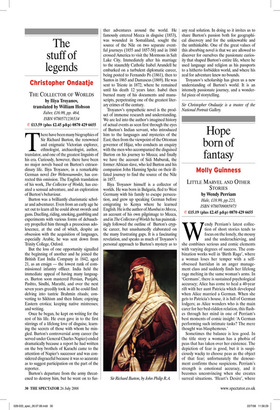The stuff of legends
Christopher Ondaatje
THE COLLECTOR OF WORLDS by Iliya Troyanov, translated by William Hobson Faber, £16.99, pp. 464, ISBN 9780571236534 0 £13.59 (plus £2.45 p&p) 0870 429 6655 There have been many biographies of Sir Richard Burton, the renowned and enigmatic Victorian explorer, ethnologist, archaeologist, author, translator, and one of the greatest linguists of his era. Curiously, however, there have been no major novels based on Burton’s extraordinary life. Iliya Troyanov, in a remarkable German novel Der Weltensammler, has corrected this omission. The English translation of his work, The Collector of Worlds, has created a sensual adventure, and an exploration of Burton’s behaviour.
Burton was a brilliantly charismatic scholar and adventurer. Even from an early age he set out to learn all he could about swords and guns. Duelling, riding, smoking, gambling and experiments with various forms of debauchery propelled him through a precocious adolescence, at the end of which, despite an obsession with the acquisition of languages, especially Arabic, he was sent down from Trinity College, Oxford.
But the loss of one opportunity signalled the beginning of another and he joined the British East India Company in 1842, aged 21, as an ensign — the lowest rank of commissioned infantry officer. India held the immediate appeal of having many languages. Burton soon mastered Persian, Punjabi, Pashto, Sindhi, Marathi, and over the next seven years greedily took in all he could find: delving into tantric Brahmin rituals; converting to Sikhism and then Islam; enjoying Eastern erotica; keeping native mistresses; and writing.
Once he began, he kept on writing for the rest of his life. He even gave in to the first stirrings of a lifelong love of disguise, learning the secrets of those with whom he mingled. Burton’s controversial army career (he served under General Charles Napier) ended dramatically because a report he had written on the boy brothels of Karachi came to the attention of Napier’s successor and was considered disgraceful because it was so accurate as to suggest participation on the part of the reporter.
Burton’s departure from the army threatened to destroy him, but he went on to fur ther adventures around the world. He famously entered Mecca in disguise (1853), was wounded in Somaliland, sought the source of the Nile on two separate eventful journeys (1855 and 1857-58) and in 1860 crossed America to visit the Mormons in Salt Lake City. Immediately after his marriage to the staunchly Catholic Isabel Arundell he embarked on a turbulent diplomatic career, being posted to Fernando Po (1861), then to Santos in 1865 and Damascus (1869). He was sent to Trieste in 1872, where he remained until his death 12 years later. Isabel then burned many of his documents and manuscripts, perpetrating one of the greatest literary crimes of the century.
Troyanov’s sympathetic novel is the product of immense research and understanding. We are led into the author’s imagined history of actual events as seen first through the eyes of Burton’s Indian servant, who introduced him to the languages and mysteries of the East; then from the viewpoint of the Ottoman governor of Hijaz, who conducts an enquiry with the men who accompanied the disguised Burton on his journey to Mecca; and finally we have the account of Sidi Muburak, the former African slave, who led Burton and his companion John Hanning Speke on their illfated journey to find the source of the Nile in 1857.
Iliya Troyanov himself is a collector of worlds. He was born in Bulgaria, fled to West Germany with his family to escape persecution, and grew up speaking German before emigrating to Kenya where he learned English. He is the author of Mumbai to Mecca, an account of his own pilgrimage to Mecca, and in The Collector of Worlds he has painstakingly followed the outline of Burton’s cryptic career, but unashamedly elaborated on the many frustrating gaps. It is a fascinating revelation, and speaks as much of Troyanov’s personal approach to Burton’s mystery as to any real solution. In doing so it invites us to share Burton’s passion both for geographical discovery and for the unknowable and the unthinkable. One of the great values of this absorbing novel is that we are allowed to discover for ourselves the passionate curiosity that shaped Burton’s entire life, where he used language and religion as his passports to a hitherto forbidden world, and where his zeal for adventure knew no bounds.
Troyanov’s scholarship has given us a new understanding of Burton’s world. It is an intensely passionate journey, and a wonderful piece of storytelling.
Sir Christopher Ondaatje is a trustee of the National Portrait Gallery.


























































 Previous page
Previous page